The COVID-19 crisis has hit the Albanian economy severely, with a sharp decrease in tax revenue, an upsurge in debt, and loss of jobs. While still supporting the country’s recovery from the 2019 earthquake, the European Delegation (EUD) to Albania has mobilised its staff and financial resources to respond to the health crisis. Acting on both fronts, the long-lasting collaboration between the EUD and the Albanian Ministry of Finance and Economy has proved essential in planning and achieving short and long-term results.
When the COVID-19 outbreak started in Albania in March 2020, the EUD had to face two major challenges simultaneously. In a context of enlargement with a longer timeframe, it was not used to providing immediate support. In the absence of specific tools, existing instruments and working methods had to be mobilised in a proactive way to help reduce the impact of the health crisis.
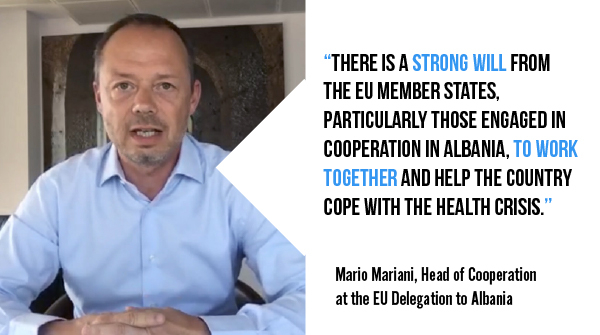
At the same time, the country was still recovering from the 2019 earthquake(1) and many international partners, including the EU, were focusing efforts on offering post-earthquake recovery support. The EUD was therefore confronted with the challenge of ensuring an adequate and efficient response to two major crises.
Best practices from the EUD Albania
To address this situation, the EUD took a series of internal measures to offer short and long-term responses. “Regardless of the portfolio distributed among the staff members, during the first wave of the pandemic we changed the way we worked and set up ad hoc teams to act on different areas of intervention at the same time,” said Mario Mariani, Head of Cooperation at the EUD to Albania.
The following practices were shared by the Head of Cooperation to Albania on how the EUD is handling the COVID crisis:
- Sequence planning: During the first phase of the crisis – the most critical phase – breaking issues down was crucial when planning under huge pressure.
- Working in different clusters: This allowed the EUD team to address many issues simultaneously, and to mobilise all available human resources.
- Striking a balance between short and medium-term interventions: The EUD short-term operations also tried to retain a strong systemic and reform-oriented approach. This has allowed for flexibility, synergy-building and coordination with Development Partners.
- Coordination with other actors: The EUD was not previously active in the health sector. It therefore reached out to partners to address the most urgent needs in this domain.
Addressing the rise of unemployment
The collaboration between the EUD and the Albanian Ministry of Finance and Economy has yielded positive results, taking steps to fight the spread of the virus, and agreeing on measures to protect workers during the pandemic.
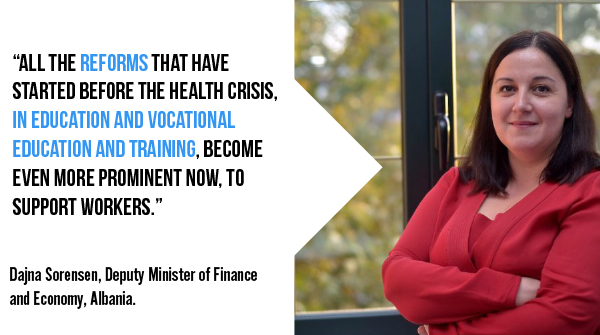
"Beyond mitigating the short-term needs of the most vulnerable groups, we are also working on a medium-term recovery. This is one of the biggest supports that we are receiving from the EUD directly as we speak,” explains Dajna Sorensen, Deputy Minister of Finance and Economy of Albania.
The impact of the COVID-19 crisis in Albania has hit some workers harder than others. The design of employment promotion measures focused on addressing the needs of those in situation of vulnerability such as women, youth, Roma minority and people with disabilities.
These measures are part of the long-term reform in the area of employment and skills, and of the national employment strategy.
To address such challenges, the EU Delegation and the Ministry of Finance and Economy are offering support to private businesses and employees affected by the COVID-19 crisis, under the Economic Recovery programme.
Such an approach has allowed the EUD and the government to work on short-term interventions while keeping the focus on social cohesion, one of the main strategic objectives of the reform in Albania.
Click on the play button below to watch our video about the EU Delegation to Albania response to COVID-19.
Watch our full interviews with Dajna Sorensen, Deputy Minister of Finance and Economy of Albania and Mario Mariani, Head of Cooperation at the EUD to Albania.
Credit: Videos © Capacity4dev | Photo ©EU Delegation to Albania.
(1) In November 2019, Albania was hit by a high magnitude earthquake, which took a toll on physical infrastructure and economic activity, leaving a burden on the budget prior to COVID-19.
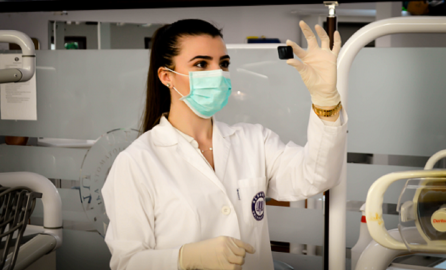

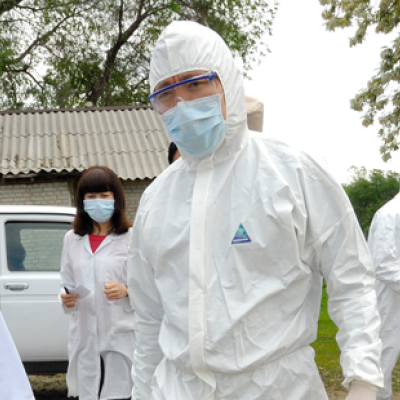
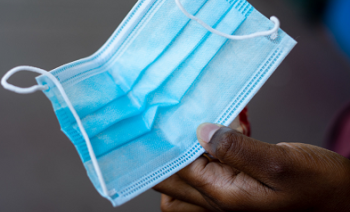
Log in with your EU Login account to post or comment on the platform.